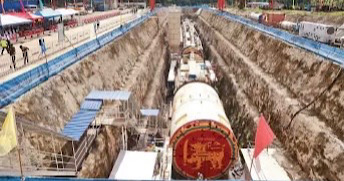Longest irrigation tunnel in South Asia to be completed by 2026
The completion of a 96-kilometre water conveyance project in the North Central Province is one of the challenges facing Sri Lanka's new government. Key for local communities, it will benefit up to 100,000 families. One of its main objectives is to promote the fishing industry, livestock farming, and tourism.
Colombo (AsiaNews) – Infrastructure development is one of the main challenges facing Sri Lanka's new president Anura Kumara Dissanayake, a Marxist-inspired leader who heads a left-wing anti-system coalition.
One of the most important infrastructures currently under construction is a 96 km irrigation mega-tunnel in the North Central Province, to be completed by 2026. The longest of its kind in all South Asia, it is part of the Maha Ela project designed to transport water from the Moragahakanda reservoir to Mahakanadarawewa.
The project includes a 27.7-kilometre tunnel between Konduruwawa and Mahameegaswewa, with an estimated cost of 49 billion rupees (almost US$ 163 million), a milestone in providing water in the region.
The project is also set to promote the freshwater fishing industry, livestock farming, and tourism.
Initially launched in the 1970s to improve farmers' incomes, food security, and domestic and industrial water supply, it had to be abandoned due to the country’s civil war but restarted in 2021.
The tunnel is considered the backbone of a 65-kilometre conveyance system to divert water from the Moragahakanda and Kalu Ganga reservoirs in Rajarata, in the northern arid zone.
As the tunnel route passes through three wildlife sanctuaries, less than four kilometres from the Siririya Rock Fortress, a UNESCO World Heritage Site, the system will be built underground to protect Sri Lanka's unique fortress, forest environment, and wildlife.
About 39 per cent of the work has been completed so far. Once it is done, in cooperation with China, it will provide direct and indirect benefits to over 850,000 households.
Speaking to AsiaNews, irrigation experts Randesh Weerakoon and Dushmini Herath explained that “once the entire Maha Ela project, including the tunnel is completed, it will provide drinking water to areas served by the Mahakanadarawa, Padaviya, Wahalkada and Yan Oya reservoirs.”
Overall, “1,505 small tanks will be fed by the project, and irrigation will be supplied to 3,000 hectares of land.”
“Meanwhile, with the completion of the project, freshwater fishing industry will increase”; it “will also support animal husbandry and foster potential for tourism. As forest reserves will be established, human-elephant conflicts will also be mitigated,” Randesh and Dushmini noted.
The Mahaweli Water Security Investment Program (MWSIP), Sri Lanka's largest infrastructure development initiative, is the final phase of the broader Mahaweli Development Programme (MDP).
Once completed, it will contribute to the socio-economic development of the country with exceptional investments in conveying water through the North Central Province Canal Project (NCPCP).
The latter includes social, environmental, and economic components, with the construction of new infrastructures such as multi-purpose dams, tunnels, canals, and associated works.
For nutritionists Dilantha Samaraweera and Supuni Kahatapitiya, the “lack of safe drinking water is a major cause of kidney disease among those living in the North central, Northern and Eastern provinces. Once the project is completed, 100,000 families in 13 divisional secretariats in the North Central Province will benefit from improved access to potable water.”







.png)










